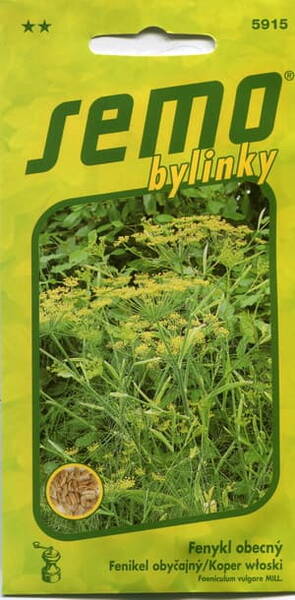The herbaceous plant is similar to dill. Stem height up to 100-120 cm. For open ground. Leaves with an anise aroma and a sweetish-spicy taste are used for food.
Use: spicy-aromatic and medicinal. Fresh and dried leaves as a spice for meat, fish and vegetable dishes. Fennel pairs especially well with legumes. Fennel fruits are used for medicinal purposes.
1,0 g = 200-300 seeds.
* Useful properties of fennel.
Fennel fruits contain potassium, magnesium, calcium, zinc, iron, copper, aluminium and chromium. Fennel preparations have antispasmodic and carminative effects, increasing the secretory activity of the digestive glands and promoting digestion. They act as mild diuretics and expectorants.
Usually, fennel preparations are prescribed for diseases of the gastrointestinal tract, accompanied by spasms, flatulence and pain in the intestines (spastic colitis and intestinal colic). Especially effective is "dill water" for children based on annual fennel.
It is also used for cholelithiasis and kidney stones, bronchitis and whooping cough, scanty menstruation and sexual infantilism.
The internal use of infusion of fruits in combination with external washings is useful for mycoses (fungal skin lesions).
The fruits of the plant are part of many carminative, laxative teas and sedative fees.
Pharmaceutical dill has an expectorant and disinfectant effect, which is why in folk medicine the eyes are washed with a decoction of fennel seeds for conjunctivitis, and the skin for pustular diseases.
It is also drunk for flatulence, abdominal pain, coughing and insomnia, and also to improve milk production in nursing mothers.
In Indian medicine, fruits are used as a stimulant and the roots as a laxative.
Fennel essential oil perfectly cleanses the body and removes toxins, especially for those who are fond of rich food and alcohol.
It has a diuretic and mild laxative effect.
Influencing the digestive system eliminates constipation, flatulence, and nausea. In menopause, fennel oil is very effective, as it stimulates the production of its own estrogen.
Helps increase lactation.
It has high antifungal activity. When sanitizing the premises, it reduces the content of fungi in the atmosphere by 4-5 times.
Fennel oil has a hepatoprotective effect in toxic liver damage.
Increases appetite and secretion of digestive and bronchial glands.
Has a beneficial effect on the skin.
Rinsing the mouth with fennel decoction eliminates sore throat and hoarseness.
To use the medicinal properties of fennel, it is ground into powder in the morning, afternoon and evening, each time 1/2 teaspoon is brewed in a small cup of boiling water and sweetened and eaten. This composition helps with flatulence and facilitates digestion.
! Dangerous properties of fennel.
Fennel, like many medicinal herbs, has both beneficial properties and contraindications: first of all, individual intolerance to this plant is possible (if you feel nausea or dizziness after using it, then you should stop using fennel, of course). Also, despite its ability to increase milk flow in breastfeeding mothers, fennel annual is recommended only if its benefits outweigh the potential harm from its intolerance. A similar approach is used when prescribing remedies for people who have epileptic seizures.
Overdose or abuse of fennel-based products can lead to indigestion or cause an allergic reaction.
Precautions when using fennel must also be observed in case of heart rhythm disturbances.
Many doctors note that a large amount of the plant eaten can even cause bleeding.
Remember: in any case, the use of fennel should be started with small doses so that it is possible to notice its negative impact on your body in time.
Eng.: Garden fennel. Bot. syn.: Foeniculum capillaceum Gilib., Foeniculum officinale All.
Do you need a fennel in the garden?
FENNEL - the closest relative of fragrant dill, family Umbelliferae - a valuable food and medicinal plant.
The leaves serve as a seasoning for soups, meat dishes and vegetables and as a spice in canning. Formed by the bases of the petioles of the basal leaves, the "heads" are used for food and shoots and roots are also consumed. They are boiled and eaten with butter and breadcrumbs.
Fennel is used as a digestive aid, as well as carminative and expectorant. Its fruits have an antifungal, and anti-inflammatory effect, increasing the amount of milk in nursing mothers. It is widely used in violation of bowel function, to improve appetite, and bile separation, as well as in cholelithiasis and kidney stones. In the form of dill water, fennel is especially often prescribed for babies.
Fennel, like dill, is rich in vitamins B1, B2, C, PP and contains folic acid, provitamin A, salts of iron, phosphorus, potassium, calcium and essential oils.
Medicinal recipes using "pharmaceutical dill":
- with spasms of the gastrointestinal tract, flatulence, bronchitis with sputum difficult to pass: pour 1 teaspoon of crushed seeds with 1 cup of boiling water, leave for 10 minutes and strain. Take 1/2 cup 3 times a day (before meals).
- when coughing: pour 5 grams of crushed seeds with 1 cup of boiling water, simmer on low heat for 30 minutes and leave for 1 hour and strain. Take 2 tablespoons 3 times a day, 20 minutes before meals.
- with cholelithiasis, chronic pancreatitis: pour 3 teaspoons of crushed seeds with 1 cup of boiling water in a thermos, leave for 1 hour and strain. Take 3 tablespoons 4-5 times a day.
- an expectorant for inflammatory diseases of the upper respiratory tract, pneumonia: pour 3 teaspoons of crushed seeds with 1 cup of boiling water, leave for 30 minutes and strain. Take 2 tablespoons 4 times a day.
- for urolithiasis, pour 2 teaspoons of crushed seeds with 1 cup of boiling water and leave for 1 hour and strain. Take 3 tablespoons 4 times a day.
When tired.
❖ If fatigue or stress caused a headache, try drinking in the evening (preferably at night), 1 cup of an infusion of equal parts of chamomile flowers, mint leaves, fennel fruit and valerian root. 2 tbsp. spoons of this mixture, brew 0.5 litres of boiling water and insist overnight in a thermos.















